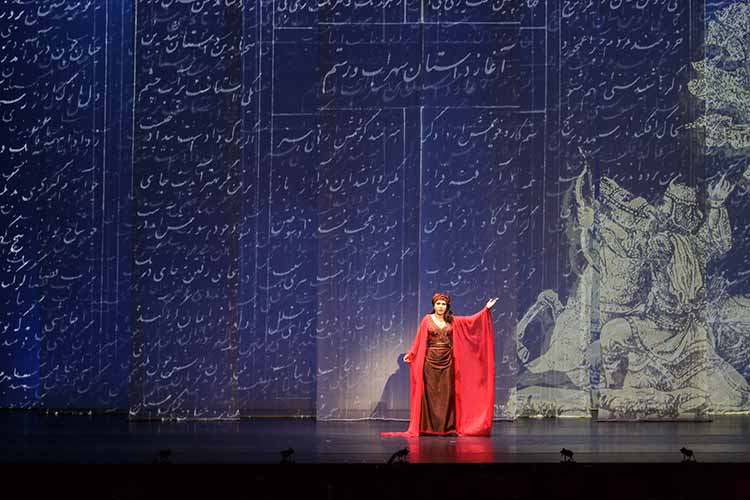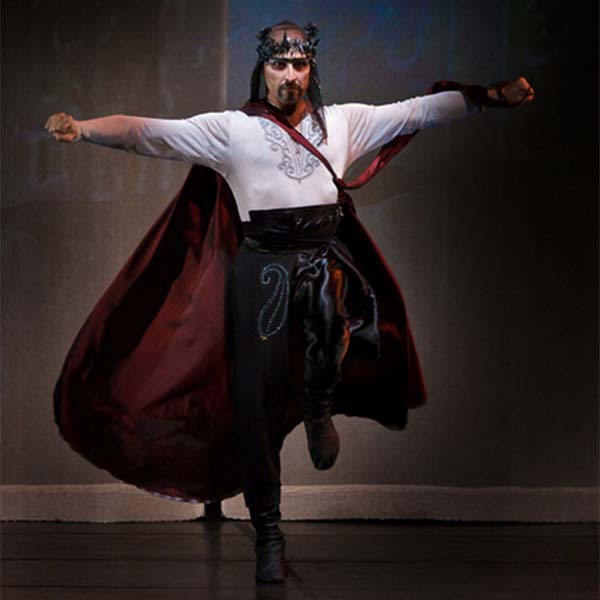UC San Diego Theatre Production Broadcast to Reach Millions
Published Date
By:
- Cynthia Dillon
Share This:
Article Content

Gordafarid, as Story-teller and Ferdowsi. Photo by Jim Carmody/UC San Diego
The University of California, San Diego Division of Arts and Humanities recently sponsored, “The Scarlet Stone,” a modern dance/theater retelling of a tragic Persian myth developed by Shahrokh Yadegari, professor of sound design in the Department of Theatre and Dance. The production was performed last summer at UC San Diego’s Mandell Weiss Forum, toured to Toronto for the Tirgan Festival—the largest Persian arts festival in the western hemisphere—and then to Los Angeles at UCLA's Royce Hall. This production, which involves university faculty and alumni, will reach more than 14 million viewers worldwide through four satellite broadcasts during the week of Feb. 8 on BBC Persian in Iran, Tajikistan, Afghanistan, and online streaming at the time of broadcast.
“The production had great critical and popular success in all of its performances, and I am truly delighted that the piece is to be broadcast on BBC Persian,” explained Yadegari, adding that he has spent the last three months preparing the recording that will air in February and in March, around the Persian New Year. “The piece is about the contemporary political condition of Iran in relation to its past 1,000-year history. The reaction of Iranians in diaspora and non-Iranians interested in the sociopolitical life of Iran has been phenomenal. However, the fact that now people in Iran will see the piece is really important to me.”

Afshin Mofid, DC, portraying one of the warriors from the Shahnameh. Photo by Jim Carmody/UC San Diego
The production revolves around one of the most important mythical stories of a millennium-old epic poem, the Shahnameh, about a father and son, mythic warriors, who unexpectedly meet on the battlefield without recognizing each other. The Shahnameh, written by Hakim Abu ʾl-Qasim Ferdowsi (935 to 1020 CE), is believed to have saved Persian language and culture after the Islamic takeover of Iran.
Traditionally, the stories of the Shahnameh are performed in the streets or coffee/tea houses by male storytellers, with paintings and drawings as backdrops. Based on Mohreye Sorkh, the last work of contemporary poet Siavash Kasrai, Yadegari’s version combines the Shahnameh’s form of storytelling with contemporary poetry of Iran to portray the complex contemporary history of Iran, serving as a symbol for reflection and conversation in regard to the present political situation of Iranian people.
Yadegari uses advanced interactive projections and multichannel spatialized sound in his production, in which he adapts the two texts, directs the action, composes the music and designs the soundscape. He also involves principal dancers, including his main collaborator, the renown Iranian-French choreographer Shahrokh Moshkin Ghalam, and the first official female narrator of the Shahnameh, Gordafarid. Four UC San Diego Theatre and Dance and Visual Arts alumni are involved in the production, too: Ian Wallace ‘11, set and interactive projection design; Wen-Ling Liao ‘12, lighting design; Zach Kennedy ‘13, stage management; and Norbert Shieh ‘05, director of photography.
Yadegari noted the importance of the project to Distinguished Professor of Mechanical and Aerospace Engineering, Sia Nemat-Nasser, and his wife, Eva, who support the production of “The Scarlet Stone” through the Roghieh Chehre-Azad Endowed Fund for the Arts, created to foster new projects and future scholarly works that explore the music, art, literature and history of Persian culture. Nemat-Nasser established the fund to honor the memory of his mother, “Chehre-Azad,” a famous female actor in Iran who began her career when it was forbidden for women to appear on stage. Despite threats of beating and stoning, Chehre-Azad pursed her passion and ultimately became regarded as the “Mother of Theatre and Film” in Iran, according to Nemat-Nasser, who also helped translate the Shahnameh for Yadegari’s production.
“Professor Shahrokh’s work is remarkable,” said Nemat-Nasser. “I am pleased to be able to give back to the university and support work that my mother would have enjoyed.”
Nemat-Nasser, who was born and grew up in Iran and attended undergraduate and graduate school in California, shared some of the history of the deep sectarian divisions in the Middle East, where Yadegari’s production will be aired next week and again in March.
“This broadcast is a good idea,” said Nemat-Nasser.
For more information about the “The Scarlet Stone,” visit the website.
Share This:
You May Also Like
Stay in the Know
Keep up with all the latest from UC San Diego. Subscribe to the newsletter today.



